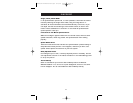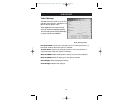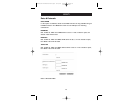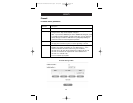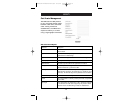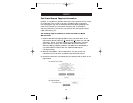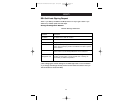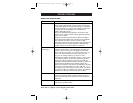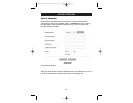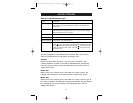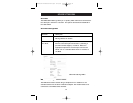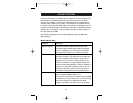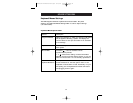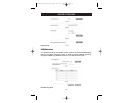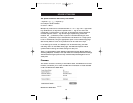
NETWORK SETTINGS MENU
29
Remote Access Options Table
Control Description
Transmission Encoding The Transmission Encoding setting allows you to change the
image-encoding algorithm that is used to transmit the video data
to the Remote Access window. With these settings, it is possible to
optimize the speed of the remote screen depending on the number
of parallel users and the bandwidth of the connection line
(Modem, ISDN, DSL, LAN, etc.).
Normal: The Standard Encoding algorithm, well-suited for many
parallel users in a LAN environment. Typical applications generate
traffic of up to 15Kbps.
Compressed: The data stream between the RIPC and the Remote
Access window will be additionally compressed to save bandwidth.
The compression encoding is suited for a modem or ISDN
environment. However, since the compression takes processing time
on the RIPC itself, this encoding shouldn’t be used when many
parallel users want to access the RIPC at the same time.
Use Sun's Java Instructs the web browser of your administration system to use the
Browser Plug-In JVM (Java Virtual Machine) of Sun Microsystems. The JVM in the
browser is used to run the code for the Remote Access window,
which is actually a Java applet. If you check this box for the first
time on your administration system and the appropriate Java
plug-in is not already installed on your system, it will be
downloaded and installed automatically. However, in order to make
the installation possible, you still need to answer the according
dialogs with “YES”. The download volume is around 11MB. The
advantage of downloading Sun’s JVM lays in providing a stable and
identical Java Virtual Machine across different platforms. The
Remote Access software is optimized for this JVM version and offers
wider range of functionality when run in Sun’s JVM. (Hint: If you
are connected over a slow connection to the Internet, you can also
pre-install the JVM on your administration machine. The software is
available on the CD that is delivered along with the RIPC.)
Mouse Hot Key Allows specifying a hot key combination that starts either the
mouse synchronization process if pressed in Remote Access, or is
used to leave the single mouse mode. The key codes are listed in
Appendix C.
User-Defined Hot Keys User-defined hot keys simulate keystrokes on the remote system
that cannot be generated locally.
Note: Click on “Append” for the changes to take effect.
P74238-A-F1DE101G-man.qxd 4/10/03 4:25 PM Page 29



